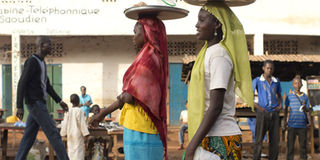Christian vigilante groups trap 14,000 Muslims in Central Africa town

PHOTO | MIGUEL MEDINA Members of the Muslim community walk in the main street of Boda on April 8, 2014. They are trapped in the village of Boda, surrounded by the Christian anti-Balaka militias.
What you need to know:
- Crisis escalates as number of displaced people swells
- The group, members of an extended family, fled to Boda from the village of Danga 25 kilometres (15 miles) away, seeking shelter from the anti-balaka — or “anti-machete”, mainly-Christian militia groups that have been hunting and killing members of the crisis-torn country’s Muslim minority.
BODA, Central African Republic
Stifled by the heat inside a barn in the Central African Republic town of Boda, dozens of emaciated and often sick displaced people subsist in fear of the vigilantes who surround them.
The group, members of an extended family, fled to Boda from the village of Danga 25 kilometres (15 miles) away, seeking shelter from the anti-balaka — or “anti-machete”, mainly-Christian militia groups that have been hunting and killing members of the crisis-torn country’s Muslim minority.
But days after the family arrived in Boda, fierce clashes broke out between the anti-balaka and local Muslims, ending with the Christian militia forces encircling the southwestern diamond-mining town.
More than 14,000 Muslims, including the displaced family from Danga, are now trapped inside with no way out and very limited supplies.
“I am suffering very much. No house, no food. The anti-balaka are killing people — many,” said Saifou, one of those sheltering in the suffocating barn.
“I have lost many things, even my cattle. I had 800 of them,” said Saifou — who, like some 200 other displaced people stuck in the town, is from the Fula ethnic group, a predominantly Muslim, herding people whose members are scattered across west and central Africa.
Boda began its bloody downward spiral at the end of January, after coup leader-turned-president Michel Djotodia gave up power under international pressure.
Djotodia was accused of letting ex-fighters from Seleka, the mainly Muslim rebel coalition that swept him to power 10 months earlier, wage a campaign of atrocities against the Christian majority.
Seleka fighters abandoned Boda after Djotodia stepped down, and horrific fighting broke out between people of both faiths. More than 100 people were killed in a week.
The bloodshed — which typifies the terrifying plunge into ethno-religious violence that has swept the country — was halted by the arrival of French peacekeeping troops.
Since then, however, anti-balaka forces have laid siege to the town, once called “Boda the Beautiful” for its majestic, centuries-old trees.
A woman in the barn who was nursing a malnourished baby lifted up her shirt and squeezed her breast to show that she had no milk for her infant. Her mother, Khadidja Labi, lay immobile on a mat, already looking like death.
Labi was unsuccessful in signing on for the scarce food handed out each morning by staff of the UN World Food Programme (WFP). The last distribution was four weeks ago, time enough to weaken the family and make them more susceptible to diarrhoea and less resistant to diseases such as scabies and malaria.
The most feeble have died. Yet those who could still stand on trembling legs proved ready to stumble forward and greet visitors.
Karim, clad in a brightly coloured shirt, came back from the food handout disgruntled. “The WFP isn’t giving us sugar, no honey, no firewood, just rice and maize,” he said.
“The Christians wanted to kill us to take away our property. We can’t even go the mosque in our district,” added Karim, who was born in Boda and had wanted “to stay here”.





